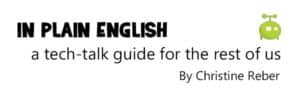
If you don’t know your IP from your URL or your VLAN, this column is for you! Welcome to In Plain English, where you’ll learn some techie stuff from a non-tech person who just so happens to have worked with a bunch of computer geeks for the last 25 years.
Today’s Topic – What’s an SSL Certificate?
Have you ever taken an international trip? If so, you probably needed to bring your passport – some sort of “real ID” that verifies your identity with your home country and the countries you are visiting. That’s basically what an SSL Certificate does, too.
An SSL (secure sockets layer) certificate is a digital certificate that verifies the identity of a website and encrypts information sent to a server using SSL technology. A certificate is an electronic “passport” that establishes an online entity’s credentials when doing business on the web.
HTTP and HTTPS – what’s the difference?
If you’ve ever wondered what the difference is between HTTP or HTTPS when browsing the internet, you’re not alone. The “S” in HTTPS stands for Secure, which is the SSL Certificate in action. On the other hand, HTTP data is not encrypted and is therefore more vulnerable to interception by third parties to gather data being passed between your computer and the site.
When you attempt to send confidential information to a website, your browser (Chrome, Edge, Firefox) validates the SSL certificate and confirms that it is a secure, trusted connection. The information transmitted then becomes encrypted. Encryption is a process of scrambling data into an undecipherable format that can only be returned to a readable format with the proper decryption key.
Why do I need an SSL certificate?
Here at EZ Micro, we require our clients to use SSL certificates in order to make remote access more secure. It secures communication between a home computer and your office. It also allows users to make web transactions with a decreased risk of data theft and builds trust and confidence in the mind of customers. An SSL certificate is a key component in any business’ comprehensive data security plan. It’s as important as virus protection and backups!
Here are some examples of situations where you would want to make sure an SSL certificate is being utilized – banking websites, client portals, health information portals, online shopping websites, remote desktop connections, access to work-related email on personal cell phones, file sharing websites. So, pretty much all websites!
Does your website need an SSL certificate?
The short answer is Yes. No site is too small or too large to get hacked. The guys in the black hats only have one goal: to find vulnerabilities on the Web and exploit them. Google began marking websites as “not secure” in 2018 if it is not protected by an SSL certificate. Don’t give anyone a reason to not do business with you.
It is very important to note, however, that just because a site is using HTTPS doesn’t mean that the company can be trusted. A fraudulent company can still use an SSL certificate. How do you know if you should trust them? Return to the age-old adage—if it sounds too good to be true, it probably is. If you’re not sure and would like us to investigate it, feel free to contact us.

